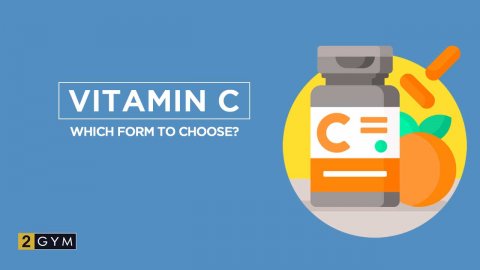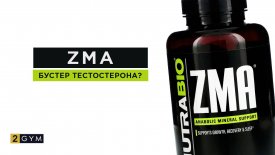Vitamin C is found in natural plant-based foods such as fruits and vegetables. However, it can also be obtained in the form of supplements.
If you realize that you consume an insufficient amount of this micronutrient, a reasonable solution would be to resort to the help of dietary supplements.
Which Form of Vitamin C to Choose?
The effectiveness of absorbing vitamin C may vary depending on its form. Before buying vitamin C, we recommend that you read this article.
Factors such as bioavailability and stability play an important role in determining which form of vitamin C will be most effective for maximum absorption by the body.
Vitamin C supplements are most commonly available in the form of ascorbic acid, sodium ascorbate, ascorbyl palmitate, ascorbyl glucoside, and vitamin C complexes with bioflavonoids.
Ascorbic Acid
Ascorbic acid, also known as vitamin C, is one of the most studied and widely used forms of this vitamin. It has many vital functions in the body, including:
- Collagen synthesis
- Antioxidant protection
- Immune system support
- Iron absorption
Advantages
- Wide Availability: Ascorbic acid is the most accessible form of vitamin C, available in various forms and dosage options, including tablets, powder, capsules, and chewable candies.
- Proven Effectiveness: Ascorbic acid has scientifically proven effectiveness in performing its functions in the body.
- Low Cost: Ascorbic acid is one of the cheapest forms of vitamin C.
Disadvantages
- Stomach Irritation: Some people may experience stomach irritation when taking high doses of ascorbic acid or on an empty stomach.
- Instability: Ascorbic acid is susceptible to external factors such as light, heat, and moisture, which can lead to its loss during storage.
- Short Duration of Action: Ascorbic acid is rapidly excreted from the body, so it needs to be taken regularly.
Features
- Water Solubility: Ascorbic acid is a water-soluble vitamin, meaning it is easily excreted from the body through urine.
- Need for Regular Intake: Since the body cannot synthesize vitamin C on its own, it needs to be obtained regularly from food or supplements.
- Interaction with Other Medications: Ascorbic acid may interact with some medications, so it is important to consult a doctor before taking it.
Who Should Use Ascorbic Acid
- People who want to replenish vitamin C deficiency: Ascorbic acid is an effective way to replenish vitamin C deficiency, which can be caused by unbalanced diet, stress, smoking, or some diseases.
- People who want to improve immune function: Ascorbic acid plays an important role in maintaining immune system function, helping the body fight infections.
- People who want to protect themselves from free radicals: Ascorbic acid has powerful antioxidant properties, neutralizing free radicals and protecting cells from damage.
Sodium Ascorbate
Sodium ascorbate (NaC6H7O6), also known as sodium ascorbate, is a salt of ascorbic acid (vitamin C).
In this form, vitamin C is neutralized by sodium, making it less acidic and gentler on the stomach. Sodium ascorbate is highly soluble in water and has the same bioavailability as ascorbic acid.
Advantages
- Gentle on the Stomach: Sodium ascorbate does not cause stomach irritation, making it an ideal choice for people with sensitive digestive systems.
- Enhanced Absorption: Due to neutralization by sodium, sodium ascorbate is more easily absorbed by the body than ascorbic acid.
- Stability: Sodium ascorbate is more resistant to light, heat, and moisture compared to ascorbic acid, extending its shelf life.
- Suitable for Injections: Sodium ascorbate is used for intravenous injections to treat vitamin C deficiency.
Disadvantages
- Sodium Content: Sodium ascorbate contains a small amount of sodium, which should be considered by people limiting salt intake.
- Less Common: Sodium ascorbate is less common than ascorbic acid and may not be as readily available.
- Higher Cost: Sodium ascorbate is generally more expensive than ascorbic acid.
Features
- Antioxidant Protection: Sodium ascorbate, like ascorbic acid, has powerful antioxidant properties, neutralizing free radicals and protecting cells from damage.
- Immune System Support: Vitamin C plays a crucial role in supporting immune system function, helping the body fight infections.
- Connective Tissue Strengthening: Sodium ascorbate is involved in collagen synthesis, a protein that is a primary component of connective tissue.
- Improved Iron Absorption: Vitamin C aids in the absorption of iron from food, which is important for preventing anemia.
Who Should Use Sodium Ascorbate
- People with Sensitive Stomachs: Sodium ascorbate is a gentler form of vitamin C compared to ascorbic acid, making it suitable for individuals with sensitive digestive systems.
- People Taking High Doses of Vitamin C: When taking high doses of vitamin C, sodium ascorbate may be gentler on the stomach.
- People Requiring Intravenous Vitamin C: Sodium ascorbate is used for intravenous injections to treat vitamin C deficiency.
- People Seeking a More Stable Form of Vitamin C: Sodium ascorbate is more resistant to light, heat, and moisture compared to ascorbic acid.
Ascorbyl Palmitate
Ascorbyl palmitate, also known as ascorbyl palmitate, is a fat-soluble form of vitamin C.
In this form, vitamin C is esterified with palmitic acid, making it more resistant to external factors and allowing it to be easily absorbed in the intestine.
Advantages
- Enhanced Absorption: Due to its fat-soluble nature, ascorbyl palmitate is absorbed more efficiently by the body than water-soluble forms of vitamin C, such as ascorbic acid.
- Prolonged Action: Ascorbyl palmitate is slowly released in the body, providing a longer duration of action compared to ascorbic acid.
- Stability: Ascorbyl palmitate is less susceptible to light, heat, and moisture compared to ascorbic acid, extending its shelf life.
- Gentle on the Stomach: Ascorbyl palmitate does not cause stomach irritation, making it an ideal choice for people with sensitive digestive systems.
Disadvantages
- Higher Cost: Ascorbyl palmitate is generally more expensive than ascorbic acid.
- Less Common: Ascorbyl palmitate is less common than ascorbic acid and may not be as readily available.
- Not Suitable for Injections: Ascorbyl palmitate is not used for intravenous injections as it is not water-soluble.
Features
- Antioxidant Protection: Ascorbyl palmitate, like other forms of vitamin C, has powerful antioxidant properties, neutralizing free radicals and protecting cells from damage.
- Immune System Support: Vitamin C plays a crucial role in supporting immune system function, helping the body fight infections.
- Connective Tissue Strengthening: Ascorbyl palmitate is involved in collagen synthesis, a protein that is a primary component of connective tissue.
- Improved Iron Absorption: Vitamin C aids in the absorption of iron from food, which is important for preventing anemia.
Who Should Use Ascorbyl Palmitate
- People with Sensitive Stomachs: Ascorbyl palmitate is a gentler form of vitamin C compared to ascorbic acid, making it suitable for individuals with sensitive digestive systems.
- People Seeking a More Stable Form of Vitamin C: Ascorbyl palmitate is more resistant to light, heat, and moisture compared to ascorbic acid.
- People Requiring Prolonged Action of Vitamin C: Ascorbyl palmitate is slowly released in the body, providing a longer duration of action.
Ascorbyl Glucoside
Ascorbyl glucoside, also known as ascorbyl glucoside, is a stable form of vitamin C in which the ascorbic acid molecule is linked to a glucose molecule.
This makes ascorbyl glucoside water-soluble but more resistant to light, heat, and moisture than ascorbic acid.
Advantages
- Enhanced Absorption: Ascorbyl glucoside gradually releases vitamin C in the intestine, providing more efficient absorption compared to ascorbic acid.
- Prolonged Action: Due to slow release, ascorbyl glucoside provides a longer duration of vitamin C action in the body.
- Gentle on the Stomach: Ascorbyl glucoside does not cause stomach irritation, making it an ideal choice for people with sensitive digestive systems.
- Stability: Ascorbyl glucoside is more resistant to external factors than ascorbic acid, increasing its shelf life.
Disadvantages
- Higher Cost: Ascorbyl glucoside is generally more expensive than ascorbic acid.
- Less Common: Ascorbyl glucoside is less common than ascorbic acid and may not be as readily available.
- Not Suitable for Injections: Ascorbyl glucoside is not used for intravenous injections as it is not water-soluble.
Features
- Antioxidant Protection: Ascorbyl glucoside, like other forms of vitamin C, has powerful antioxidant properties, neutralizing free radicals and protecting cells from damage.
- Immune System Support: Vitamin C plays a crucial role in supporting immune system function, helping the body fight infections.
- Connective Tissue Strengthening: Ascorbyl glucoside is involved in collagen synthesis, a protein that is a primary component of connective tissue.
- Improved Iron Absorption: Vitamin C aids in the absorption of iron from food, which is important for preventing anemia.
Who Should Use Ascorbyl Glucoside
- People with Sensitive Stomachs: Ascorbyl glucoside is a gentler form of vitamin C compared to ascorbic acid, making it suitable for individuals with sensitive digestive systems.
- People Seeking a More Stable Form of Vitamin C: Ascorbyl glucoside is more resistant to light, heat, and moisture compared to ascorbic acid.
- People Requiring Prolonged Action of Vitamin C: Ascorbyl glucoside is slowly released in the body, providing a longer duration of action.
Complexes of Vitamin C with Bioflavonoids
Complexes of vitamin C with bioflavonoids are a combination of vitamin C with bioflavonoids such as rutin and quercetin.
Bioflavonoids are a group of plant pigments that possess antioxidant and anti-inflammatory properties.
Advantages
- Improved Absorption: Bioflavonoids such as rutin increase the absorption of vitamin C in the body.
- Enhanced Antioxidant Protection: The combination of vitamin C and bioflavonoids provides stronger antioxidant protection than vitamin C alone.
- Anti-inflammatory Properties: Bioflavonoids have anti-inflammatory properties that may be beneficial for various conditions.
- Reduced Risk of Cardiovascular Diseases: Consumption of complexes of vitamin C with bioflavonoids may reduce the risk of developing certain cardiovascular diseases.
- Immune System Support: Vitamin C and bioflavonoids support immune system function, helping the body fight infections.
Disadvantages
- Not All Complexes Are Equal: The quality and composition of complexes of vitamin C with bioflavonoids can vary significantly.
- Possible Side Effects: Some people may experience side effects such as nausea, diarrhea, and headache when taking complexes of vitamin C with bioflavonoids.
- Interaction with Medications: Bioflavonoids may interact with certain medications, so it's important to consult a doctor before taking them.
Features
- Wide Range of Action: Complexes of vitamin C with bioflavonoids have a broader spectrum of action than vitamin C alone.
- Synergistic Effect: The combination of vitamin C and bioflavonoids provides a synergistic effect, enhancing their beneficial properties.
- Natural Source: Bioflavonoids are natural substances found in many fruits and vegetables.
Who Should Use Complexes of Vitamin C with Bioflavonoids
Complexes of vitamin C with bioflavonoids may potentially offer more benefits in certain cases for specific categories of people.
- For Those Wanting to Improve Vitamin C Absorption: Some people have difficulty absorbing vitamin C from food. This may be due to various factors such as inadequate consumption of fruits and vegetables, gastrointestinal diseases like Crohn's disease and ulcerative colitis, as well as the intake of certain medications such as aspirin and contraceptives.
- Those Seeking Stronger Antioxidant Protection: Vitamin C and bioflavonoids are powerful antioxidants. The combination of vitamin C and bioflavonoids provides stronger antioxidant protection than vitamin C alone. The antioxidant protection of complexes of vitamin C with bioflavonoids can help protect cells from damage caused by free radicals.
- People Looking to Reduce the Risk of Certain Diseases: Complexes of vitamin C with bioflavonoids have anti-inflammatory and antioxidant properties. These properties may help reduce the risk of developing some chronic diseases. Bioflavonoids can also help improve blood vessel function and lower blood pressure.
- Those Wanting to Strengthen the Immune System: Complexes of vitamin C with bioflavonoids may help strengthen the immune system and make the body more resistant to infections. Bioflavonoids can also help increase the production of white blood cells, which fight infections.
- People with Chronic Conditions such as arthritis, asthma, and cardiovascular diseases. Bioflavonoids have anti-inflammatory properties that may help reduce symptoms of these conditions.
- Individuals Susceptible to Stress: Complexes of vitamin C with bioflavonoids can help protect the body from the negative effects of stress.
- Smokers: Smoking increases the number of free radicals in the body, which can lead to cell damage. Complexes of vitamin C with bioflavonoids can help protect the body from this damage.
- Those Wanting to Improve Skin Health: Vitamin C plays an important role in collagen production, a protein that gives the skin elasticity and firmness. Bioflavonoids can also help protect the skin from sun damage.
Conclusion
Ascorbic acid, sodium ascorbate, ascorbyl palmitate, ascorbyl glucoside, and complexes of vitamin C with bioflavonoids are various forms of vitamin C, each with its own characteristics and advantages.
Ascorbic acid is the most common and readily available form of vitamin C. It is well absorbed but may irritate the stomach.
Sodium ascorbate is a gentler form of vitamin C compared to ascorbic acid. It is well absorbed and does not irritate the stomach.
Ascorbyl palmitate is a fat-soluble form of vitamin C, making it particularly suitable for cosmetic and pharmaceutical products.
This form is more resistant to light, heat, and moisture. It is well absorbed and provides a longer duration of action.
Ascorbyl glucoside is characterized by improved stability and absorption compared to ascorbic acid, making it the preferred choice for people with sensitive digestive systems and those seeking prolonged vitamin C activity.
Complexes of vitamin C with bioflavonoids offer additional benefits such as improved vitamin C absorption, stronger antioxidant protection, and immune system support due to the synergistic action of these components.























Log in with ( Sign Up ? )
or post as a guest
However, some people may prefer to take vitamin C earlier in the day, especially if they find that it provides them with an energy boost. Additionally, for individuals who have sensitive stomachs or experience acid reflux, taking vitamin C closer to bedtime may potentially exacerbate these symptoms in some cases due to its acidic nature. If this is a concern, taking vitamin C with food or earlier in the day may be preferable.
A dosage of 1000 mg of vitamin C per day is generally considered safe for most adults. However, it's important to note that consuming large doses of vitamin C beyond what your body needs does not necessarily provide additional health benefits and may lead to potential adverse effects in some individuals.
Possible side effects of excessive vitamin C intake (usually over 2000 mg per day) may include:
Gastrointestinal upset: High doses of vitamin C can cause diarrhea, nausea, abdominal cramps, and other gastrointestinal discomfort.
Increased risk of kidney stones: Excessive intake of vitamin C may increase the risk of developing kidney stones, particularly in individuals with a history of kidney stones or certain medical conditions affecting the kidneys.
Interference with medical tests: Very high doses of vitamin C may interfere with certain medical tests, such as blood glucose tests and stool tests for occult blood.
Iron overload: Vitamin C enhances the absorption of non-heme iron from plant-based foods. While this can be beneficial for individuals at risk of iron deficiency, excessive vitamin C intake may lead to iron overload in susceptible individuals, particularly those with hereditary hemochromatosis or other iron metabolism disorders.
In summary, 1000 mg of vitamin C per day is generally considered safe and unlikely to cause harm for most adults. However, it's essential to avoid excessive intake and to stay within recommended guidelines to minimize the risk of adverse effects.
Tolerance: Some people find that liposomal vitamin C is gentler on the stomach compared to ascorbic acid, which can sometimes cause gastrointestinal discomfort or diarrhea, especially at higher doses. Liposomal formulations may reduce these side effects, making it a more tolerable option for those with sensitive stomachs.
Convenience: Liposomal vitamin C is often available in liquid form and can be more convenient for those who have difficulty swallowing pills or prefer liquid supplements. Additionally, some people find the taste of liposomal vitamin C more palatable than traditional ascorbic acid supplements.
Cost: Liposomal vitamin C tends to be more expensive than traditional ascorbic acid supplements. This higher cost may be a consideration for some individuals, especially if they require higher doses of vitamin C for therapeutic purposes.